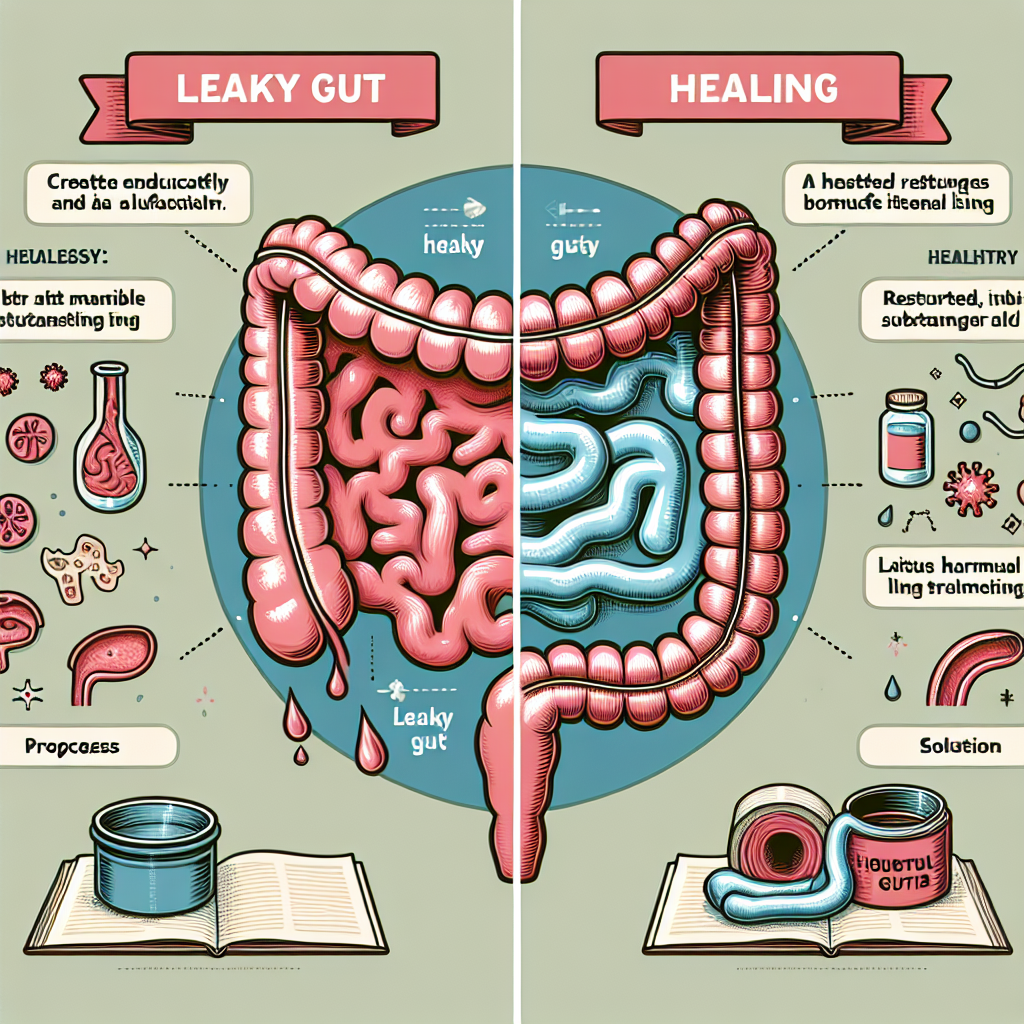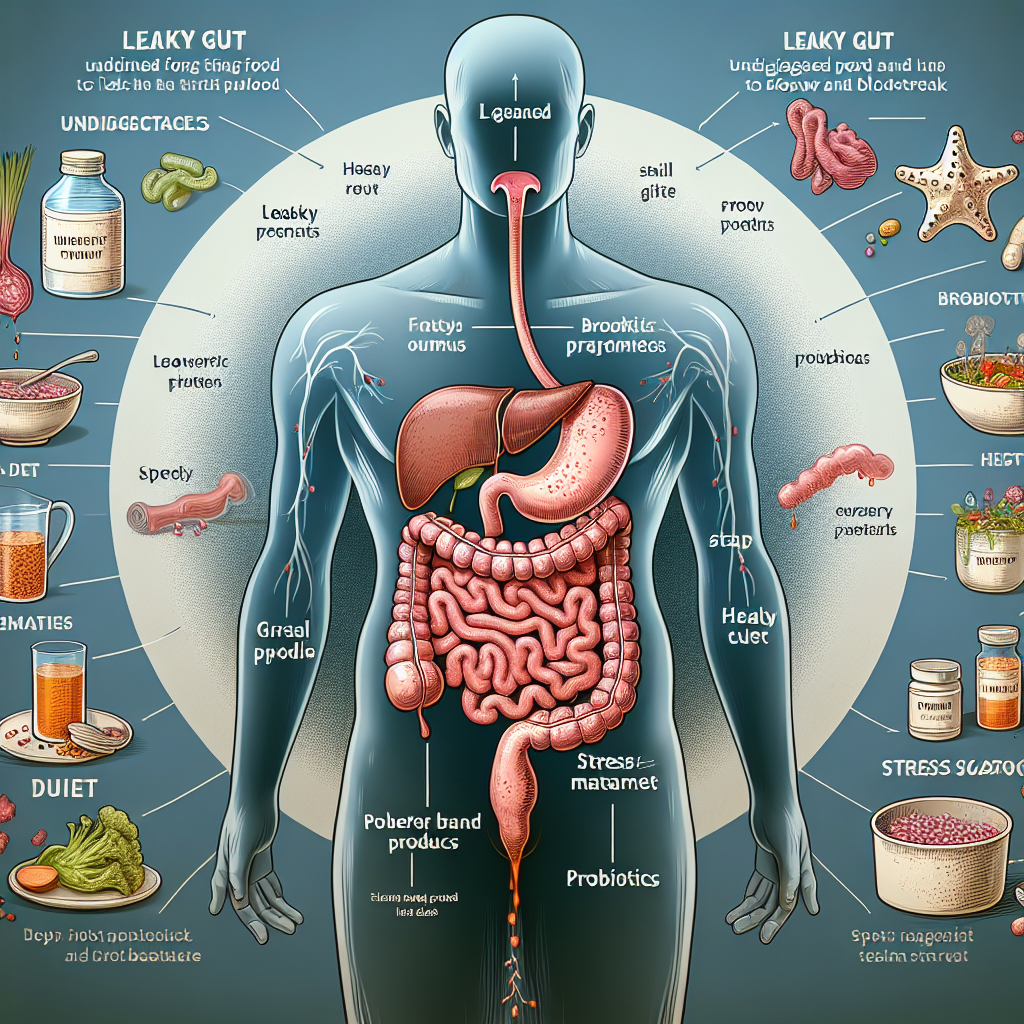Understanding Leaky Gut and How to Heal It

Discover more about understanding Leaky Gut and how to heal it. Empower your health journey today by visiting My Vibrant Vitality.
Exploring the Causes and Symptoms of Leaky Gut Syndrome
Leaky gut, also known as increased intestinal permeability, is a digestive condition that has been gaining attention in recent years. Despite its growing recognition, it remains a somewhat controversial topic within the medical community. This is largely due to the fact that it’s not yet fully understood, and research is ongoing. However, what is clear is that leaky gut can have significant impacts on overall health and wellbeing.
Leaky gut syndrome occurs when the lining of the small intestine becomes damaged, allowing harmful substances such as bacteria, toxins, and undigested food particles to leak through the intestinal wall and into the bloodstream. This can trigger an immune response, leading to chronic inflammation and a variety of health problems.
The causes of leaky gut are multifaceted and can vary from person to person. However, certain factors are commonly associated with the condition. One of the primary culprits is diet. Consuming high amounts of refined sugars, processed foods, and alcohol can damage the intestinal lining. Gluten, a protein found in wheat and other grains, has also been linked to leaky gut in some individuals.
In addition to diet, stress plays a significant role in the development of leaky gut. Chronic stress can disrupt the balance of bacteria in the gut, known as the gut microbiome, which can in turn damage the intestinal lining. Similarly, certain medications, including non-steroidal anti-inflammatory drugs (NSAIDs) and antibiotics, can harm the gut lining and disrupt the microbiome.
The symptoms of leaky gut are diverse and can affect many different systems in the body. Digestive issues such as bloating, gas, diarrhea, and irritable bowel syndrome (IBS) are common. However, because leaky gut involves the immune system and inflammation, symptoms can also extend beyond the digestive system.
Many individuals with leaky gut experience fatigue, joint pain, skin problems such as acne or eczema, and even cognitive issues like brain fog or mood swings. Furthermore, leaky gut is believed to contribute to a variety of chronic diseases, including autoimmune disorders, heart disease, and cancer.
Despite the challenges presented by leaky gut, the good news is that it is treatable, and in many cases, completely reversible. The first step in healing leaky gut is identifying and eliminating the factors that are causing damage to the intestinal lining. This often involves making dietary changes, such as reducing the intake of processed foods and sugars, and increasing the consumption of nutrient-dense, whole foods.
Stress management is also crucial in healing leaky gut. This can involve a variety of strategies, from mindfulness practices like meditation and yoga, to lifestyle changes such as getting adequate sleep and regular exercise.
Finally, certain supplements can be beneficial in repairing the gut lining and restoring the balance of the gut microbiome. Probiotics, which are beneficial bacteria, can help to replenish the gut microbiome. Other supplements, such as L-glutamine, can aid in repairing the gut lining.
In conclusion, while leaky gut is a complex condition with a wide range of causes and symptoms, understanding these factors is the first step towards healing. By making targeted dietary and lifestyle changes, and with the help of certain supplements, it is possible to repair the gut lining, restore the balance of the gut microbiome, and ultimately, improve overall health and wellbeing.
Effective Strategies for Healing Leaky Gut Naturally

Understanding leaky gut and how to heal it is a topic of growing interest in the health and wellness community. Leaky gut, also known as increased intestinal permeability, is a digestive condition where bacteria and toxins are able to “leak” through the intestinal wall. This condition is believed to contribute to a variety of health issues, including chronic inflammation, food sensitivities, and autoimmune diseases. Fortunately, there are several effective strategies for healing leaky gut naturally.
Firstly, it’s important to understand that the gut is not just a digestive organ, but an integral part of the immune system. The gut lining acts as a barrier, protecting the body from harmful substances. When this barrier is compromised, as in the case of leaky gut, it can lead to a host of health problems. Therefore, healing the gut lining is a crucial step in addressing this condition.
One of the most effective ways to heal the gut naturally is through diet. A diet rich in anti-inflammatory foods can help reduce inflammation and repair the gut lining. Foods such as bone broth, fermented vegetables, and healthy fats like coconut oil are known for their gut-healing properties. On the other hand, foods that can exacerbate inflammation and further damage the gut lining, such as processed foods, sugars, and certain types of grains, should be avoided.
In addition to dietary changes, certain supplements can also support gut health. Probiotics, for instance, can help restore the balance of beneficial bacteria in the gut, which is often disrupted in individuals with leaky gut. Other supplements, such as L-glutamine, an amino acid that helps repair the gut lining, and digestive enzymes, which can aid in the breakdown and absorption of nutrients, can also be beneficial.
Stress management is another key component in healing leaky gut. Chronic stress can negatively impact gut health by disrupting the balance of bacteria in the gut and increasing inflammation. Therefore, incorporating stress-reducing activities, such as yoga, meditation, or simply spending time in nature, can be beneficial for gut health.
Lastly, getting adequate sleep is essential for overall health and particularly for gut health. Lack of sleep can disrupt the gut microbiome and increase inflammation, both of which can contribute to leaky gut. Therefore, ensuring you get a good night’s sleep can support your gut health and aid in the healing process.
In conclusion, healing leaky gut naturally involves a multifaceted approach that includes dietary changes, supplementation, stress management, and adequate sleep. It’s important to remember that everyone’s body is unique, and what works for one person may not work for another. Therefore, it’s always a good idea to consult with a healthcare professional before starting any new health regimen. With the right strategies and a little patience, it’s possible to heal leaky gut and improve your overall health.
The Role of Diet and Lifestyle in Managing Leaky Gut Syndrome
Understanding leaky gut and how to heal it is a topic of increasing interest in the health and wellness community. Leaky gut, also known as increased intestinal permeability, is a digestive condition where bacteria and toxins are able to “leak” through the intestinal wall. This condition is believed to contribute to a range of health problems, from digestive issues to autoimmune diseases. One of the key factors in managing and healing leaky gut is diet and lifestyle.
The role of diet in managing leaky gut cannot be overstated. The gut is home to trillions of bacteria, collectively known as the gut microbiota. These bacteria play a crucial role in our health, aiding in digestion, producing vitamins, and even influencing our mood and behavior. However, when the balance of these bacteria is disrupted, it can lead to a host of problems, including leaky gut. A diet high in processed foods, sugars, and unhealthy fats can disrupt this balance, leading to an overgrowth of harmful bacteria and inflammation in the gut.
Conversely, a diet rich in whole foods, fiber, and fermented foods can help to restore this balance and heal the gut. Whole foods, such as fruits, vegetables, lean proteins, and whole grains, provide the nutrients necessary for the gut lining to repair itself. Fiber, particularly soluble fiber, acts as a prebiotic, feeding the beneficial bacteria in the gut and promoting their growth. Fermented foods, such as yogurt, kefir, and sauerkraut, are rich in probiotics, or beneficial bacteria, which can help to restore the gut microbiota.
In addition to diet, lifestyle factors also play a significant role in managing leaky gut. Chronic stress, lack of sleep, and sedentary behavior can all contribute to gut inflammation and increased intestinal permeability. Therefore, managing stress, ensuring adequate sleep, and regular physical activity are all important in healing leaky gut.
Stress management techniques, such as mindfulness meditation, yoga, and deep breathing exercises, can help to reduce inflammation and promote gut health. Adequate sleep is also crucial, as sleep deprivation can disrupt the gut microbiota and increase gut permeability. Regular physical activity, particularly aerobic exercise, can also help to reduce inflammation and promote a healthy gut.
In conclusion, diet and lifestyle play a crucial role in managing and healing leaky gut. A diet rich in whole foods, fiber, and fermented foods, along with stress management, adequate sleep, and regular physical activity, can help to restore the gut microbiota, reduce inflammation, and heal the gut. While it may seem overwhelming to make these changes, it’s important to remember that even small steps can make a big difference. Start by making one or two changes at a time, and gradually incorporate more healthy habits into your routine. With patience and consistency, it’s possible to heal leaky gut and improve your overall health.